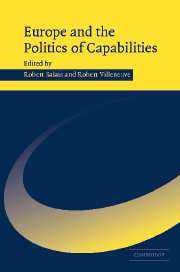Book contents
- Frontmatter
- Contents
- List of figures
- List of tables
- Notes on contributors
- Preface
- Acknowledgements
- 1 Introduction: Europe and the politics of capabilities
- Part I Products, territories and economic activity in Europe
- 2 Europe tested through its products: the Renault–Vilvoorde affair and its implication for industry and employment policies
- 3 Competences-oriented logics and the politics of unemployability
- 4 Regional capabilities and the European Employment Strategy
- 5 The territorial pacts in Italy: the competitive corporatism assumption in question
- 6 Mobilising local capabilities for a European economic project: the case of Marseilles
- 7 Employment and social dialogue at the European level: a different approach to governance of territories
- Part 2 Assessing EU procedures and European initiatives
- Part 3 What politics of capabilities?
- Appendix 1 EU bibliography
- Appendix 2 Information on EU official documents
- Index
- References
6 - Mobilising local capabilities for a European economic project: the case of Marseilles
Published online by Cambridge University Press: 22 September 2009
- Frontmatter
- Contents
- List of figures
- List of tables
- Notes on contributors
- Preface
- Acknowledgements
- 1 Introduction: Europe and the politics of capabilities
- Part I Products, territories and economic activity in Europe
- 2 Europe tested through its products: the Renault–Vilvoorde affair and its implication for industry and employment policies
- 3 Competences-oriented logics and the politics of unemployability
- 4 Regional capabilities and the European Employment Strategy
- 5 The territorial pacts in Italy: the competitive corporatism assumption in question
- 6 Mobilising local capabilities for a European economic project: the case of Marseilles
- 7 Employment and social dialogue at the European level: a different approach to governance of territories
- Part 2 Assessing EU procedures and European initiatives
- Part 3 What politics of capabilities?
- Appendix 1 EU bibliography
- Appendix 2 Information on EU official documents
- Index
- References
Summary
Introduction
Since the 1960s, building Europe has constituted one of the horizons framing the economic choices of the Member States, and has contributed to redefining regional productive specialisation. In the case of France, two periods can be clearly distinguished. A first period started with the constitution of the six-country European Common Market in the 1960s, during which centralised economic policies were framed by a new technocratic body, DATAR. These policies aimed at reshaping the economic geography of France according to two principles: eliminating ‘production overlaps’ (and, more broadly, restructuring regional economic fabrics deemed archaic or not competitive enough) and creating ‘national champis’ able to face European and international competition. In the early twenty-first century, the issue is framed in rather different terms. Instead of being State-driven, the economic destiny of a region now simultaneously plays out at the local level of ‘territorial’ authorities and at the more global level of corporate strategies. As a result, the State's ability to define the public interest – i.e. its capacity to assign objectives whose achievement, after due deliberation, seems profitable to all actors and to the collective as such – is now questioned at the local level.
In such a context, the notion of ‘territory’ has gained theoretical importance. However, it lacks a clear definition, being at best considered as the supposedly relevant level at which an efficient economic policy should be elaborated and conducted.
- Type
- Chapter
- Information
- Europe and the Politics of Capabilities , pp. 91 - 108Publisher: Cambridge University PressPrint publication year: 2005
References
- 2
- Cited by



